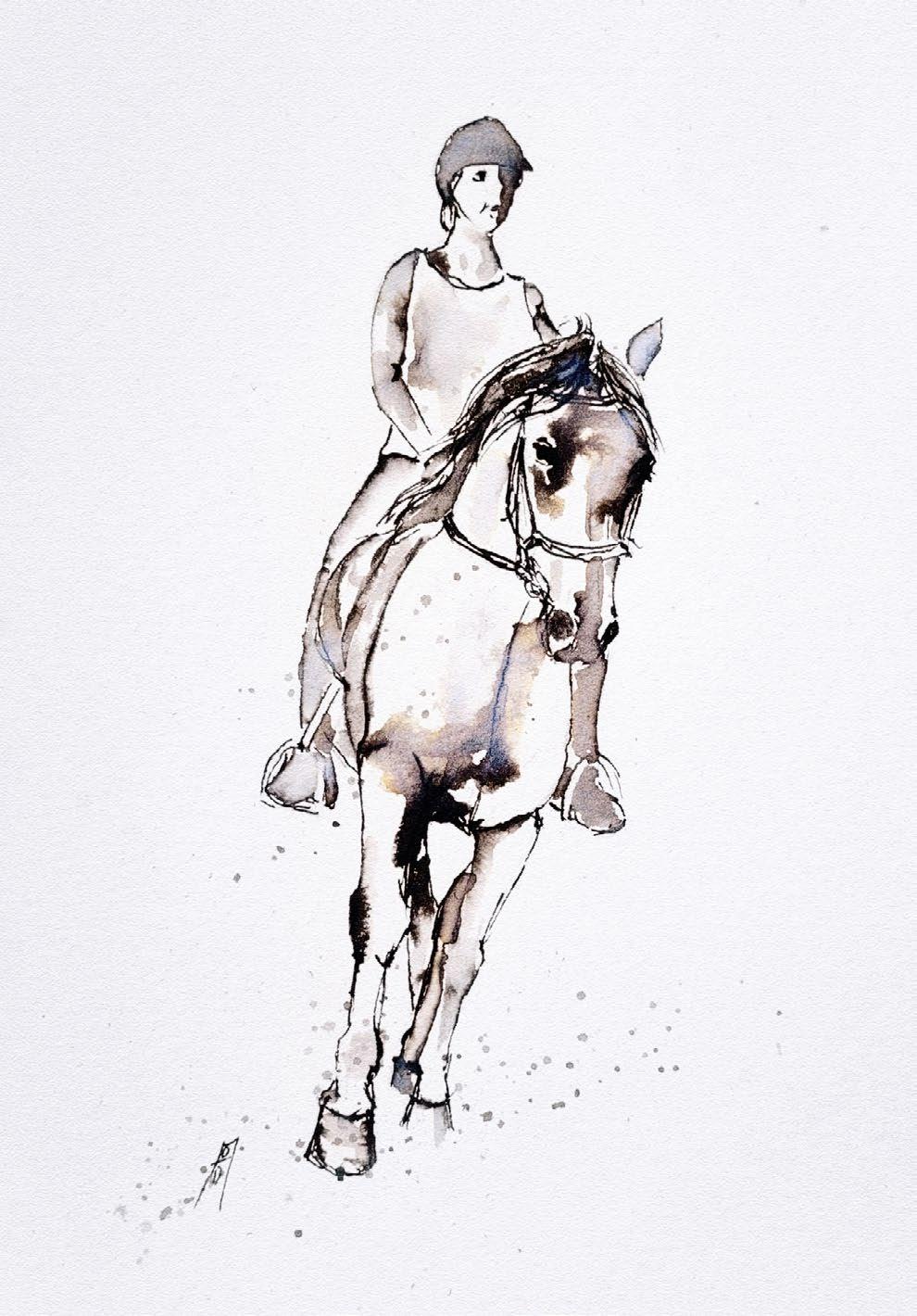
5 minute read
Revisiting the Basics
By Didi Arias Illustration by author
When it is time to go back to basics with a student, if I say “let´s give attention to the simplest and most important matters”, my summary of the Cambridge Dictionary´s definition, I´m pretty certain that there will be an interest in to what I am going to say next. But if I say “time to go back to basics”, groans and eye rolls are the frequent reactions as that phrase tends to invoke such a negative response. People prefer to imagine that they are only progressing, and the thought of taking a few steps back threatens that belief (“But I learned that ages ago, so I´m not good enough now?”). Avoiding any upset, I quickly redirect the conversation to football.
“You´ve heard about Training Camp, right?” I ask.
Sure, they all have; football Training Camp is a well-known back to basics program and accepted as part of what footballers have to do. I shouldn´t think there is anything glamorous or exciting about it, and the work is certainly rigorous and repetitive, but the practice is vital for peak performance; the coaches know it, and the footballers do too. Of course these players are professionals at the top of their sport, but if they do it, the struggling student can too. There is no need to perceive it as an insult or a punishment, nor will it involve going over and over every single skill ever learned. It is really an approach to help them be proactive in addressing whatever issues are at hand with the goal towards finding positive outcomes.
Though revisiting the basics will of course include work on technical skills, the refocus can bring in other key elements, and a few that come immediately to mind follow.
Recognizing Skipped Steps
Buck Brannaman logically stated: “If you miss the beginning, the basics, then you have to go back and visit the basics”. It is as simple as that. However, the rider doesn´t always realize that they may have missed out on some fundamentals, and that may not come to light until they have the Great Revelation or until someone points it out. I still recall realizing there were some things that I hadn´t been taught earlier on that quite honestly, someone should have thought to mention. That kind of came as a blow, especially as I´d been going along, blissfully ignorant, while in fact was little more than a piece of Swiss cheese: full of holes. By going back to basics, those gaps can be assessed and solidly filled in.
Confidence
Self-confidence is a life skill and building on it helps develop resilience, greater motivation and a sense of being capable. Revisiting the basics helps the rider achieve consistent and predictable results, and with improvement of one´s personal effectiveness, the gaining of confidence is the shiny reward.
Patience
Patience, a most certain virtue, contributes to our ability to live happier, more moral lives. If there is anything horse people need, other than deep pockets, it is an abundance of patience. While we practice the art of it in our work, it frequently seems that students are in a state of continual rush, or searching for the quick fix, have easy-to-flare tempers, and need immediate gratification. Not to mentioned that everything is “that stupid horse´s fault”. Time in the Training Camp can help the rider identify triggers and notice emotions that influence their lack of patience while exploring relaxation techniques and perhaps reassess goals.
Technical Skills
Having a good grasp of the “riding language” of communication is similar to having command of a foreign language, and it takes time and practice to become fluent. The vocabulary needs building up, and the shades and layers of meaning explored. When there is a lack of proficiency in a foreign language, communication gets complicated, misunderstandings and frustrations arise. Repeating set exercises is akin to practicing pronunciation and phrase structure, improving the accent and comprehension, making the rider a more fluent communicator.
This is also the place for riders that have fallen in to sloppy ruts of misuse (why use your seat, legs and hand when a good yank on a rein does the trick?). Revisiting technical skills can also help to re-motivate the lazy rider (“I´ll ride better tomorrow, I´m not so focused today”). I honestly hope that they don´t also say “I´ll drive better tomorrow” when they get behind the wheel. I often wonder that the student who says “I know how to do it, I just didn´t” actually does understand, when in fact, there is a good possibility that there is some basic knowledge missing. Revisiting the aid basics and their uses can improve attitude as well as performance. nightmare, there is something wonderful in imagining that we could go off to some organized Horse Rider Training Camp each year like the footballers do. But we make our own “training camps” at home when we take the time to take our students back to revisit those essential body/mind and technical skills. There are so many eyeopening moments and countless little wins, both personal and competitive, to be had.
The work also serves as a reminder to the student “who forgot” to use a very important aid. I cite the case of student I taught for several years as a youngster who returned to riding as an adult. She found herself in difficulty as she somehow “forgot” that she had eyes, and spent several weeks teaching her horse to dive to the left upon approaching every jump. Turns out she was dropping her head downwards as she rode in to a fence.
“I feel like such a fool” she told me after I pointed to the probable cause of her frustration after viewing a video she e-mailed me. “I think I need Boot Camp or something” she admitted.
Bingo, there you go!
Focus – From time to time riders can find themselves feeling blocked and not progressing. This “stuck in a rut” state can have so many origins, from tiredness and disappointment, to not having goals. Riders who always ride alone can lack creativity and input; it can feel a little lonely sometimes, unlike football, where players train in company. The good news is that the guided and structured work of going back to basics has a refocusing benefit. Many think it will be dreary and boring, but on the contrary, new inspiration and feedback, through the exercises and drills, can illuminate a way out of a funk and allow for a welcoming reset.
If a student is only ever brought back to basics again and again, the impact would be detrimental as they would not be allowed to see progress and experience the benefits of the work. They might even give up the sport altogether because that “I´ll never get good enough” mind set can happen. Likewise, it would be a disservice to our students to not move them forward due to our own limitations, and the same would be if we only dwelled on what went wrong during the ride. We cannot keep our students in a perpetual state of never really moving on to our satisfaction, to hold them back until they are “perfect”. I´ve said time and again that perfection doesn´t exist, and though we may at times take steps backwards in order to move forward, it should be exactly about that: the path forward.
I can only see the pluses for riders to periodically revisit and strengthen simple tasks; it just makes a whole lot of sense. Though it would most likely be a logistical
About the author:
Didi Arias is a Level 3 ARIA Certified Instructor and national dressage judge and teacher, who resides in Almeria, Spain.











